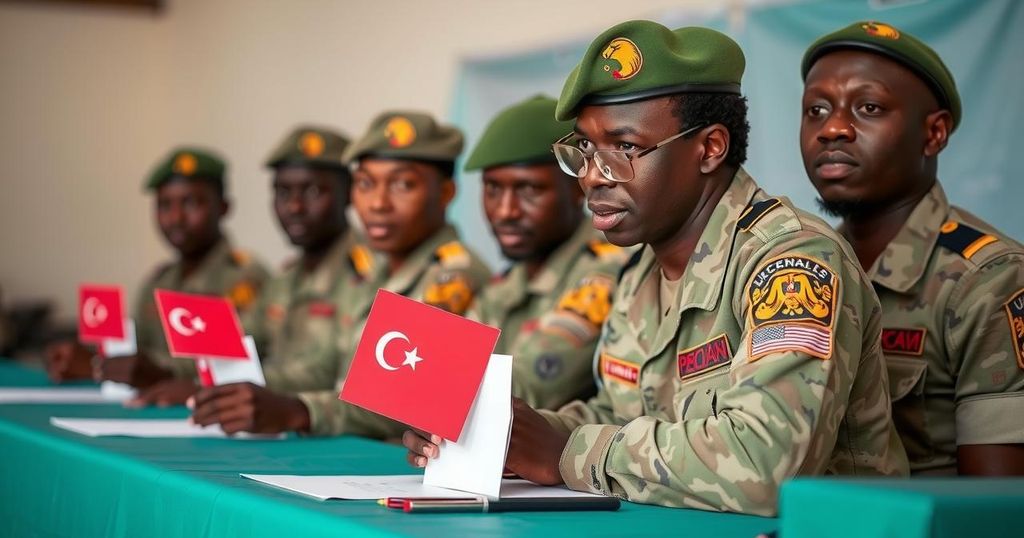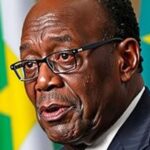Chad Seeks Military Support Amid Growing Election-related Violence
Chad’s electoral commission has requested military assistance to protect election officials and candidates ahead of the December 29 elections, amid growing violence from opposition supporters. With over 8.3 million registered voters and nearly 1,300 candidates contesting, the elections have been labeled a “masquerade” by opposition groups. The legitimacy of the electoral process remains contentious, as the ruling party is accused of attempting to consolidate power amidst rising tensions.
Chad’s electoral commission has solicited military assistance to safeguard election officials and candidates, preparing for elections scheduled on December 29. The request arose amid increasing violence, where opposition supporters reportedly attacked gatherings of the ruling Patriotic Salvation Movement (MPS) using clubs and iron bars. The National Election Management Agency (ANGE) has expressed concerns over the escalating tensions potentially leading to armed conflicts if the military does not intervene.
As the campaign for parliamentary, local council, and regional elections progresses, over 8.3 million citizens, out of the 18 million registered, are eligible to vote. Nearly 1,300 candidates from about 180 political parties are contesting the parliamentary elections, with a significant presence of local council contenders. Although over 1,000 election observers have been accredited for monitoring electoral processes, a coalition of 75 opposition parties and civil society organizations has labeled the elections a “masquerade.” They assert that President Mahamat Idriss Deby intends to leverage the elections for enhanced power consolidation.
Tensions have escalated with reports of opposition groups attacking MPS campaign caravans across major regions. Allegations of roadblocks established by opposition forces aiming to hinder MPS activities have been noted, which the military claims to have dismantled. Avocksouma Djona, the president of the Party of Democrats, has echoed concerns, advocating for the postponement of elections due to the perceived political bias embedded within the electoral management body. Furthermore, misgivings persist regarding Deby’s influence over the constitutional court, which is responsible for validating election results.
Amidst these challenges, Deby assured state television that the upcoming elections would be conducted with transparency and fairness. However, opposition factions dismissed this assertion, contending that it is an attempt to ensure control over the parliament by manipulating electoral outcomes. With a background as a transitional president since April 2021, Deby’s rule follows his father’s, who held power for three decades, prompting skepticism regarding the legitimacy of the electoral process.
The proposed elections in Chad symbolize a significant moment for a nation emerging from a three-year transitional phase following the death of President Idriss Deby Itno in April 2021. With President Mahamat Idriss Deby Itno at the helm, the electoral landscape is fraught with volatility where opposition parties claim that the ruling party, MPS, seeks to reinforce its dominance. The backdrop of political unrest, characterized by violent opposition uprisings and the government’s attempts to assure fair electoral procedures, sets the stage for heightened tensions as the election date approaches. Despite the electoral commission’s efforts to facilitate the elections, the concerns of opposition groups regarding the credibility of the electoral process, combined with the military’s mandate for protection, encapsulate the challenges that Chad faces on its path towards democratic governance.
In summary, Chad’s upcoming elections are threatened by rising violence and political unrest, prompting officials to seek military protection for election processes. The opposition’s distrust of the electoral management and accusations against the ruling party indicate a struggle for power amidst an already volatile environment. The legitimacy of these elections hangs in the balance as tensions mount, posing critical questions about the future direction of Chad’s governance and the effectiveness of its electoral systems.
Original Source: www.voanews.com








Post Comment